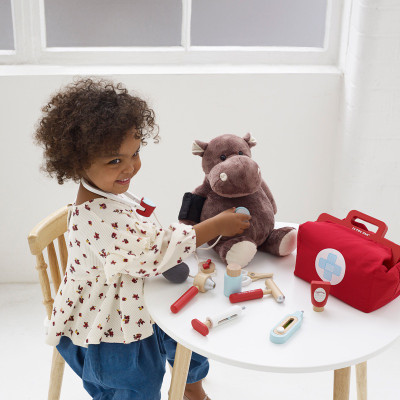Why Independent Play is a Game-Changer
Mar 28, 2025
As parents and educators, it’s natural to want to be involved in every step of a child’s learning and development. But sometimes, the most meaningful growth happens when kids are given the freedom to play on their own. Independent play—when a child explores, creates or plays without direct adult involvement—is more than just a way to keep them busy. It’s a powerful tool for building essential life skills, from confidence to creativity and emotional resilience.
Let’s explore the many ways independent play supports children’s development—and why giving kids space to play solo might just be one of the best gifts we can offer.
1. Builds Confidence and Self-Esteem
When children engage in independent play, they rely on their own ideas, instincts and problem-solving abilities. Rather than looking to an adult for constant guidance or validation, they learn to trust themselves. This sense of autonomy builds confidence—children feel proud when they independently complete a puzzle, build a block tower, or invent a game using their imagination.
Over time, this self-led exploration contributes to stronger self-esteem. Independent play empowers children to try, fail, adjust and succeed—all at their own pace, which is essential for lifelong learning and resilience.

2. Encourages Creativity and Imagination
During independent play, children are free to dream up stories, characters, and worlds without adult-led instruction. A simple toy can become a spaceship, a castle, or a jungle. Open-ended toys—like wooden blocks, animal figurines, or sensory materials—provide the perfect canvas for creativity.
Independent play also allows space for “productive boredom,” a state where children have the time and freedom to be truly inventive. This downtime is a gift in our fast-paced world, helping kids think more creatively and explore new ways to play.
3. Supports Focus and Attention Span
Engaging in solo play helps children develop their ability to concentrate for more extended periods. When they are interested and invested in an activity—drawing, building, or imaginative role-play—they practise sustaining attention without relying on adult prompts.
This deep focus is a valuable skill for school readiness and later learning. Independent play gives children the space to follow their curiosity, explore details, and learn persistence—all in a low-pressure environment.

4. Teaches Emotional Regulation
Through independent play, children often work through big feelings. A toddler might mimic a recent doctor’s visit with their doll, or a preschooler may act out frustration through a dramatic dinosaur showdown. These types of play are important emotional outlets.
By navigating these moments on their own, children begin to recognise their emotions and learn how to manage them. Independent play allows them to feel safe, seen, and in control of their stories—an essential foundation for emotional resilience.

5. Gives Parents and Educators a Break
Let’s be honest: constant supervision and entertainment is exhausting. Independent play benefits caregivers as much as it does children. It creates time windows to have a cup of tea, prepare meals, or take a breath.
Encouraging solo play doesn’t mean leaving kids unattended—it means allowing them to play safely without constant interaction. Observing from a distance can actually give parents and educators deeper insight into how a child thinks and engages with the world.

6. Prepares Kids for Real-World Learning
In the real world, children often face tasks where they need to take initiative, solve problems, and work independently. Independent play is an early form of this—an essential life skill in action.
By making their own decisions, navigating challenges and learning from trial and error, children become more capable and resilient learners. These are the same skills that will help them transition to school, thrive in group settings, and adapt to new environments.
Independent play isn’t just about keeping children entertained—it’s about helping them grow into confident, capable and creative little humans. By carving out time and space for solo play, we allow children to explore their own ideas, solve problems, and build the kind of inner strength that lasts a lifetime.
Looking to encourage more independent play at home or in the classroom? Check out our curated collection of open-ended toys designed to inspire imagination and foster self-led learning.


